It Takes a Child to
Raise a Parent
It Takes a Child to
Raise a Parent
Stories of Evolving Child
and Parent Development
Janis Clark Johnston
ROWMAN & LITTLEFIELD PUBLISHERS, INC.
Lanham Boulder New York Toronto Plymouth, UK
Published by Rowman & Littlefield Publishers, Inc.
A wholly owned subsidiary of The Rowman & Littlefield
Publishing Group, Inc.
4501 Forbes Boulevard, Suite 200, Lanham, Maryland 20706
www.rowman.com
10 Thornbury Road, Plymouth PL6 7PP, United Kingdom
Copyright 2013 by Rowman & Littlefield Publishers, Inc.
All rights reserved. No part of this book may be reproduced in any form or by any electronic or mechanical means, including information storage and retrieval systems, without written permission from the publisher, except by a reviewer who may quote passages in a review.
British Library Cataloguing in Publication Information Available
Library of Congress Cataloging-in-Publication Data Available
ISBN 978-1-4422-2161-1 (cloth : alk. paper)ISBN 978-1-4422-2162-8 (electronic)
 TM The paper used in this publication meets the minimum requirements of American National Standard for Information Sciences Permanence of Paper for Printed Library Materials, ANSI/NISO Z39.48-1992.
TM The paper used in this publication meets the minimum requirements of American National Standard for Information Sciences Permanence of Paper for Printed Library Materials, ANSI/NISO Z39.48-1992.
Printed in the United States of America
In memory of Mark Emmett Johnston,
with gratitude for our exciting partnership;
and to our children,
Ryan and Megan, who raised us as parents,
with awe and joy.
Acknowledgments
The home is the centre and circumference, the start and the finish, of most of our lives.
Charlotte Perkins Gilman, sociologist
Many people inspired the ideas on these pages. First and foremost, I am deeply indebted to my passionate parents, Lois Treasure Whitacre Clark and Robert Dale Clark, for being my first teachers and powerful role models for the basic values in my life. The public library is one of my poetic mothers many homes, as she visits there so frequently. My father turned into a voracious reader in his retirement years. Their love of learning started me on a lifelong search for knowledge and meaning. My maternal grandfather, Joseph E. Whitacre, was a writer of sermons. Both grandmothers qualify as writers. Bertha Fike Whitacre kept a daily diary for years. Vera Naragon Clark wrote long letters to family members who moved away from home. I always felt rooted as I read her newsy narratives when I left home for college and adult life.
My incredible parenting partner, Mark Emmett Johnston, taught me about being in the present moment. Marks present moment enthusiasm for life touched everything he did, but it especially embraced his parenting style. My husband and I owe a huge debt of gratitude to our two creative children, Ryan and Megan, who raised us as parents. As adults, they also helped to raise this book, providing considerable help in their own unique ways. Ryan saved my fledgling chapter on creativity when my computer crashed. His wise and patient counsel on computer snafus throughout the years has been a safety net for this project. Megan gave significant editorial suggestions through reading many early versions of chapters. Her perceptive comments and brainstorming led me into new writing terrain on many occasions.
I owe my grounding in psychology to a Manchester University psychology professor, Donald Colburn, and my initial excitement in family psychology to two Boston University graduate school professors, Fran Grossman and John Gilmore. I gained much of my early expertise in child psychology during my first professional job as a school psychologist in Lexington, Massachusetts, under the caring supervision of Celia Schulhoff. My tutorial in problem-solving theory and practice began during the time I was a consultant to the Philadelphia public schools, where I taught Interpersonal Cognitive Problem Solving (now called I Can Problem Solve) to teachers under Myrna Shures guidance. Dick Schwartz, creator of Internal Family Systems, provided valuable mentoring in working with personality parts. Julia Camerons book, TheArtistsWay, inspired me to write my own ideas. Mary Pipher modeled how to write; her books, along with her writing class, provided soul food for me.
Many people supported me through the writing process. My book group supplied start-to-finish guidance: Cathy Pidek showed support for this work at its beginning; Liene Sorenson provided reference-librarian expertise; Nancy Leonard offered ongoing, enthusiastic support; and Carol Backes graphic-design skills enhanced the line art. Writing teachers Julie Benesh, Brook Bergan, and Lisa Rosenthal suggested changes for clarity. Elizabeth Zack and Kelly Wilson contributed thoughtful editing. Many gracious readers read early versions of my work and gave valuable feedback: Tina Birnbaum, Frieda Brown, Lois Clark, Robert Clark (who said, This is deep), Jean DAmico, Alice Epstein, James Garbarino, Marnie Gielo, Mary Rose Lambke, Jordan Rifis, Gretchen Schafft, Annie Tolle, Carol Wade, Melanie Weller, Lindee Petersen Wilson, and writing-group buddies at Chicagos Newberry Library, the Oak Park Public Library, the Palos Park Public Library, and the University of Nebraska summer writing conference.
Thanks to Deborah Preiser for her promotion advice and Hannah Jennings for her creative webmaster skills and to Virginia Bridges, Kathryn Knigge, and Julia Loy, for their behind-the-scenes hours in handling publication details. Grace Freedsons agent advice and Amy Kings referral of the manuscript to her editor colleague are deeply appreciated. Finally, my heartfelt thanks goes to Suzanne I. Staszak-Silva, senior acquisitions editor at Rowman and Littlefield, for her understanding of the importance of this book.
While a book carries some original thoughts from an author, most of a books ideas represent a compilation of learning from everyone who has touched an authors life. Just as many of our current roads are built on top of ancestral byways, theories and books build upon the footpaths forged by others. However, this book could not have been written without the ongoing tutoring in life struggles that I received from my children and the children in many client families. My understanding of human nature draws upon so many of their life stories. I have been privileged with a precious opportunity to journey with these children along some of their raisingroads.
Authors Note
Nothing is so delicate and fugitive by its very nature as a beginning.
Pierre Teilhard de Chardin, French philosopher
Who am I as a parent? How am I supposed to begin parenting? Lamaze classes do not cover parenting technique. In fact, my Lamaze classes did not even mention the possibilities that my husband and I encountered in the labor and delivery of our first child. ItTakesaChildtoRaiseaParent compiles the developmental knowledge I wish I had in 1977, when I first gave birth. I never experienced parenting coursework in twenty-one years of schooling. Parent training was a do-it-yourself project. Apparently psychologists undergoing training in the 1970s were supposed to develop their own thinking about childrearing. I began my fledgling thoughts on parenting while I was a graduate student in psychology; I practiced on other peoples children.
My parenting laboratory was housed in a dozen homes; each family had different rules, and each child had different challenges. My husband and I took on numerous live-in babysitting roles when the childrens parents took vacations without their children. As a nanny couple, my husband and I puzzled over family snafus not covered in my child development textbooks; most of the dilemmas we faced were not covered.
Next page
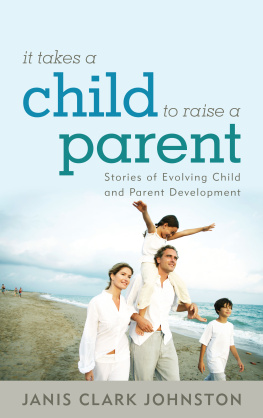
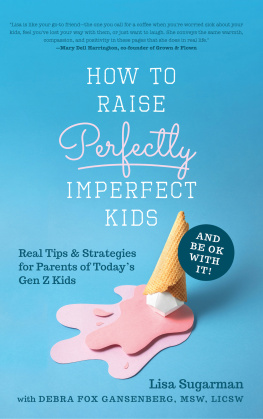
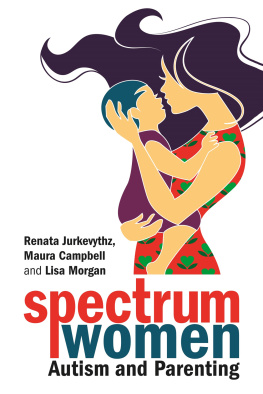
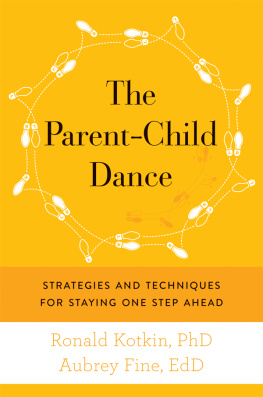

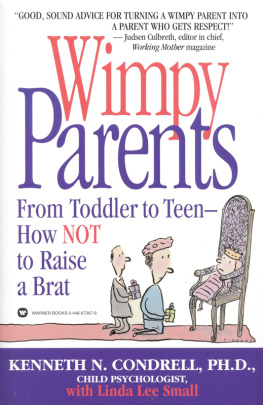
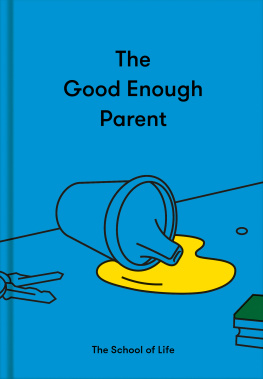

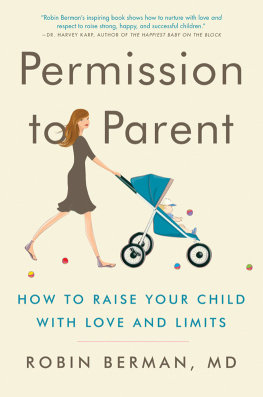
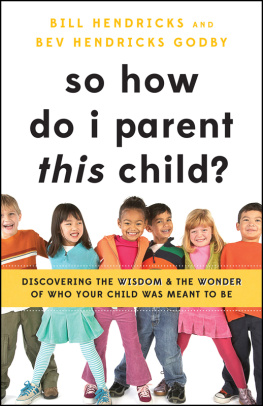
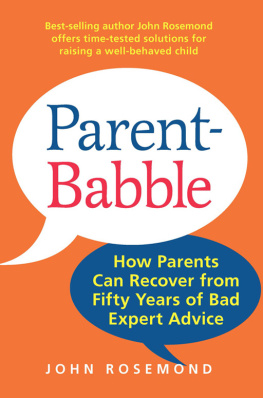
 TM The paper used in this publication meets the minimum requirements of American National Standard for Information Sciences Permanence of Paper for Printed Library Materials, ANSI/NISO Z39.48-1992.
TM The paper used in this publication meets the minimum requirements of American National Standard for Information Sciences Permanence of Paper for Printed Library Materials, ANSI/NISO Z39.48-1992.